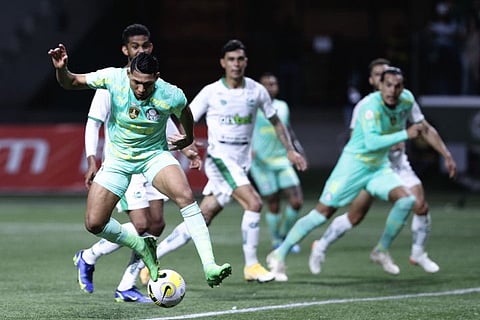Brazil prosecutors charge 16 in alleged football match-fixing scheme
Santos defender Eduardo Bauermann accused of receiving money to get yellow card

Sao Paulo: Brazilian state prosecutors charged 16 people, including seven professional football players, with alleged match-fixing and illegal betting on Wednesday in what threatens to be one of the largest scandals since Brazil legalised sports gambling in 2018.
Brazil Justice Minister Flavio Dino ordered the federal police to launch an investigation into the scheme after the charging documents were published on Wednesday.
Prosecutors of the Public Ministry of Goias said the alleged offences took place in 13 matches in Serie A and B of the Brazilian Championship, including eight played in 2022.
According to the charging documents, a criminal gang paid players to commit infractions, and would then bet on such outcomes to win payouts when the offences occurred.
The group would offer up to 500,000 reais ($100,000) as an upfront payment to the players from clubs such as Santos, Juventude, Cuiaba, Cruzeiro, Athletico Paranaense, Internacional and Fluminense, the prosecutors alleged.
Other players charged
Santos defender Eduardo Bauermann is accused of receiving at least 50,000 reais ($10,000) to get a yellow card in a match against Aval last year, according to the documents.
Gabriel Tota, Paulo Miranda, Igor Carius, Victor Ramos, Fernando Neto and Matheus Gomes are among the other players charged, according to the documents.
The Brazilian Football Federation (CBF) sent a letter to the Presidency of the Republic and the Ministry of Justice, requesting that the federal police be involved in the case, saying there is no possibility of the current competition being suspended.
Working with Fifa
“I’ve been working together with Fifa, as well as Brazilian clubs and Federations, with the aim of combating all types of crime, fraud or illicit action within football,” CBF president Ednaldo Rodrigues said in a statement.
“Those who commit crimes should not be part of Brazilian and world football.”
Sports betting has been legal in Brazil only since 2018 when the country allowed online gambling. It has exploded since then, and gambling adverts are often prominent during, before and after football matches. Brazil is currently preparing laws to tax and regulate the sector.
Sign up for the Daily Briefing
Get the latest news and updates straight to your inbox


